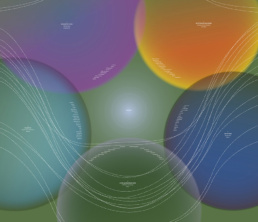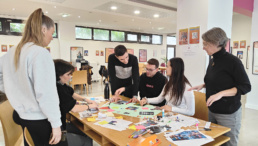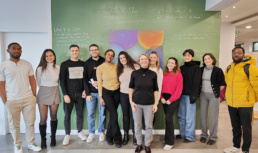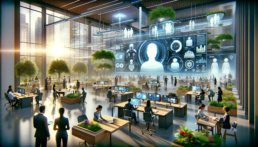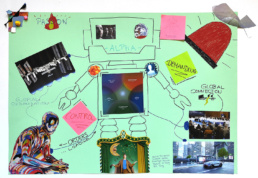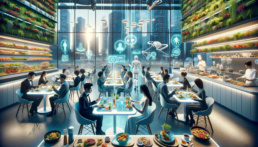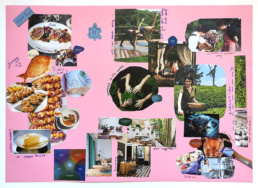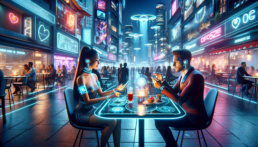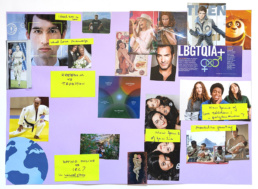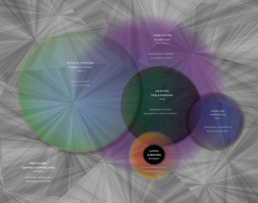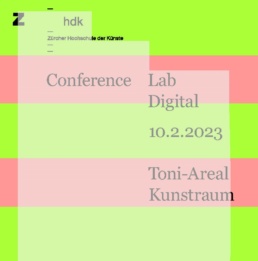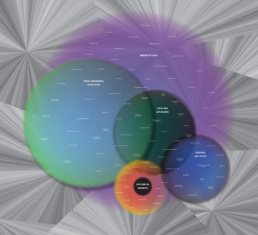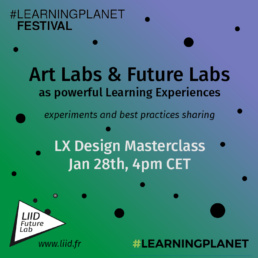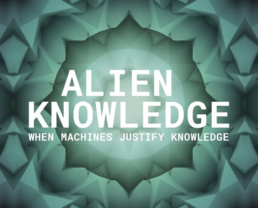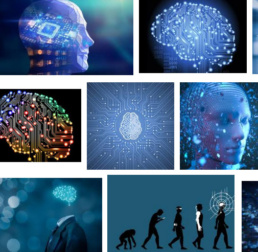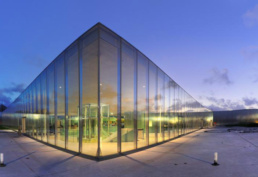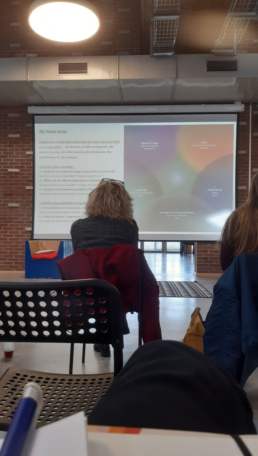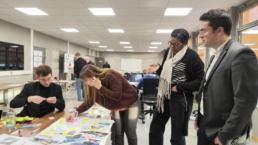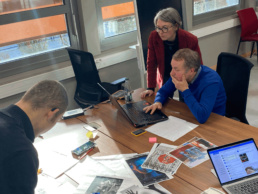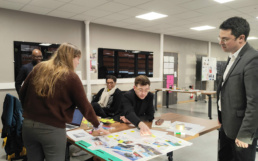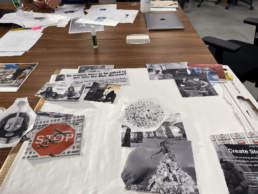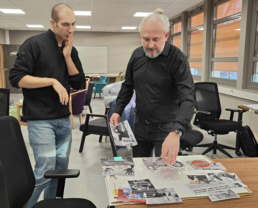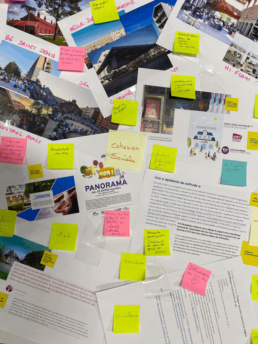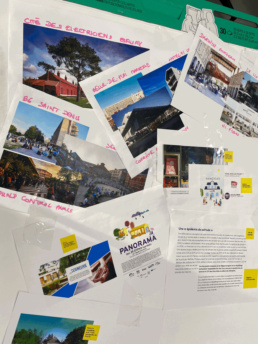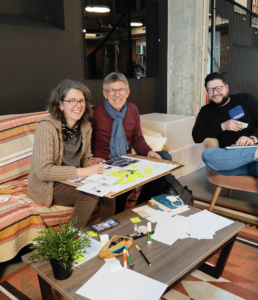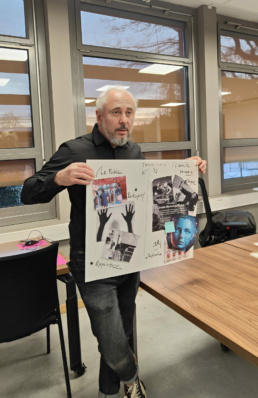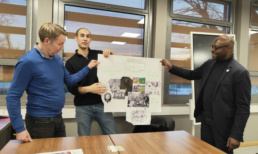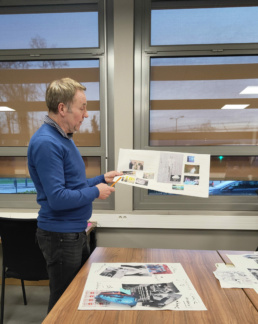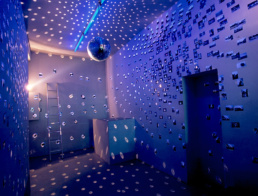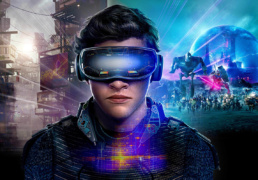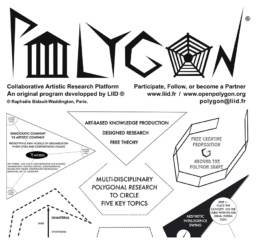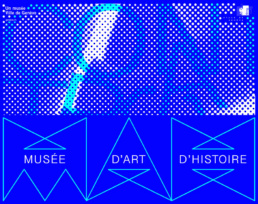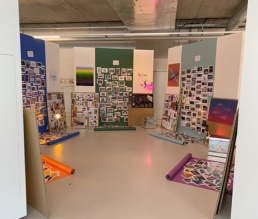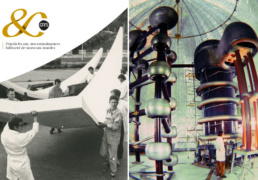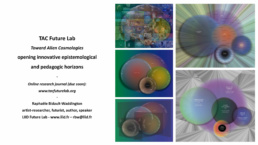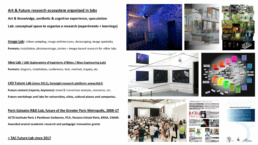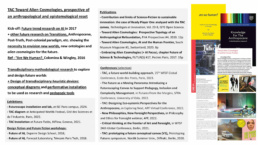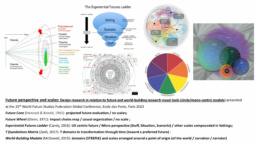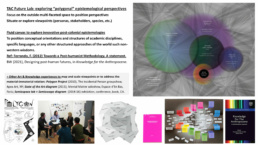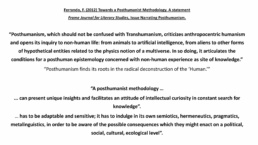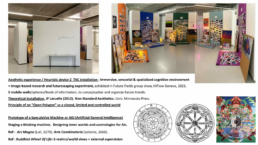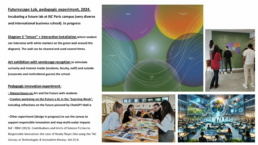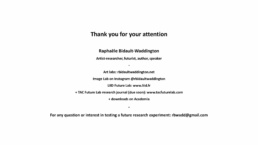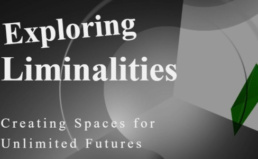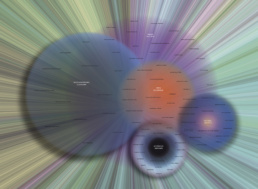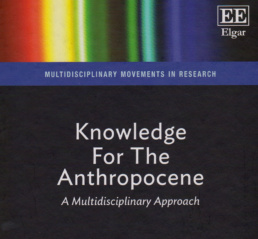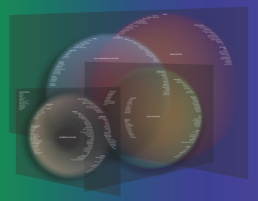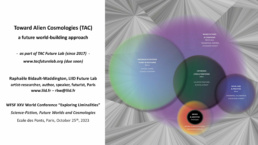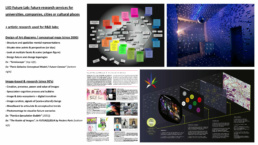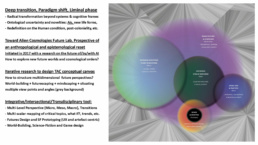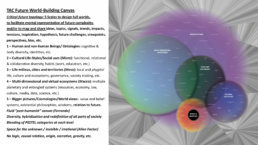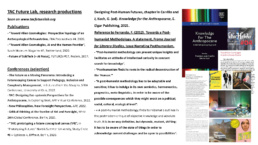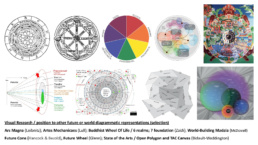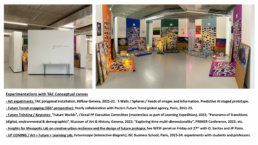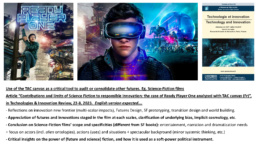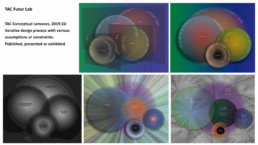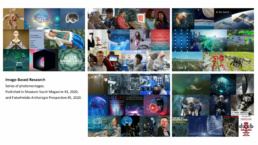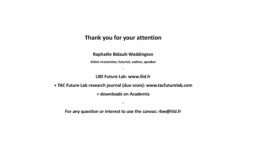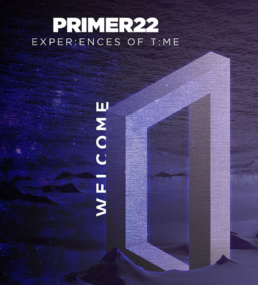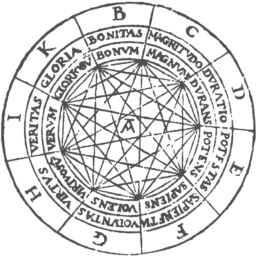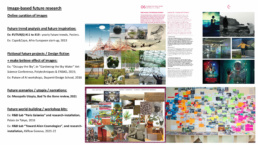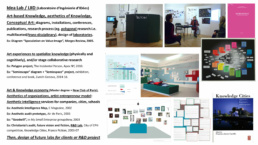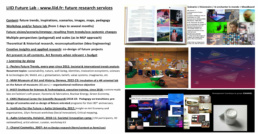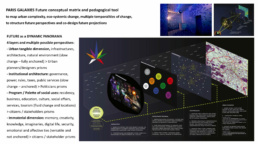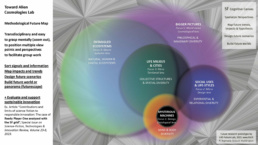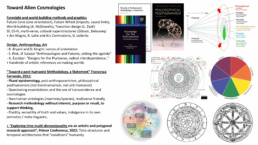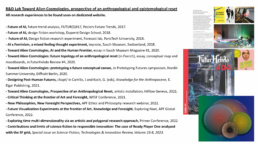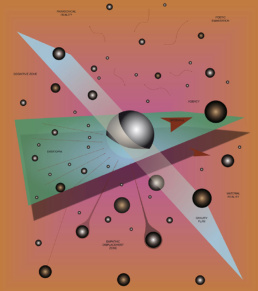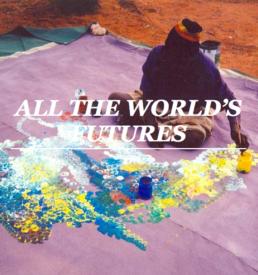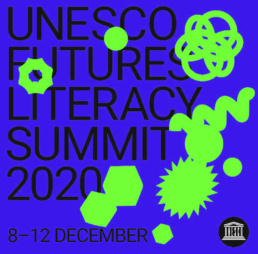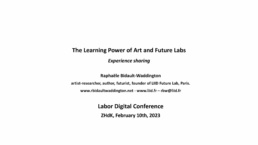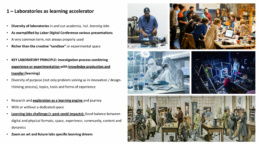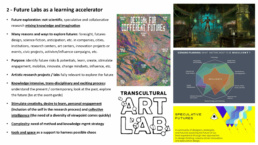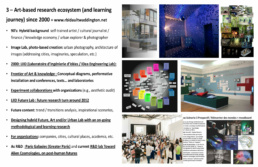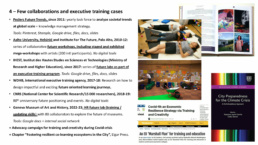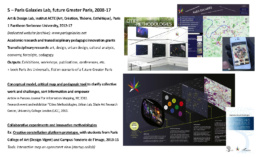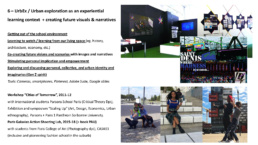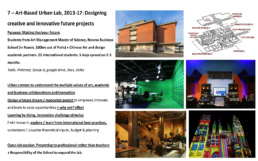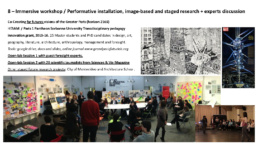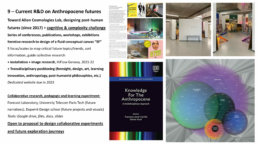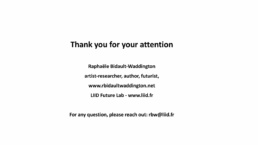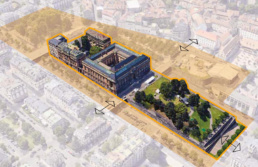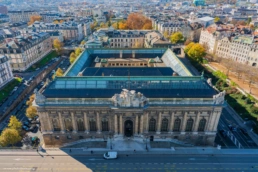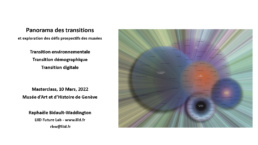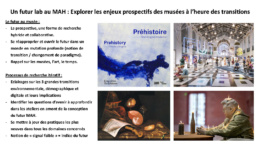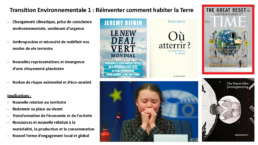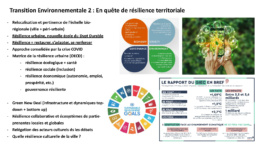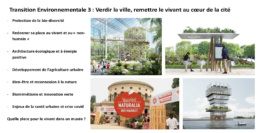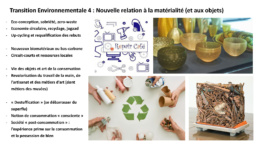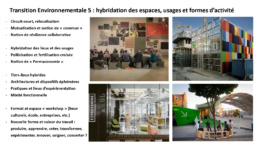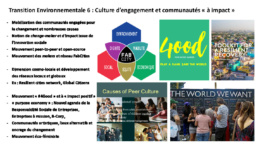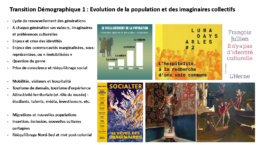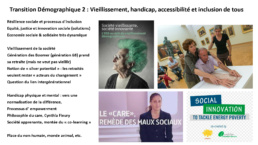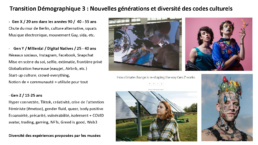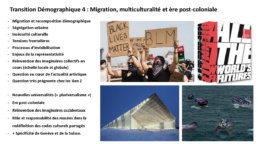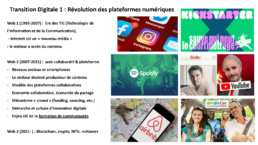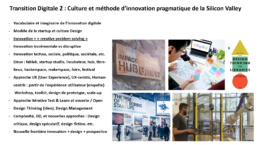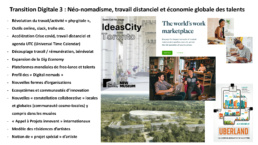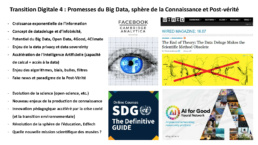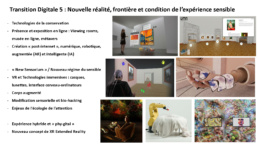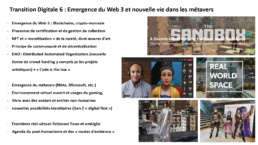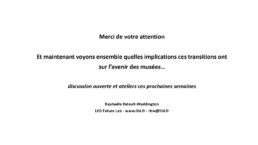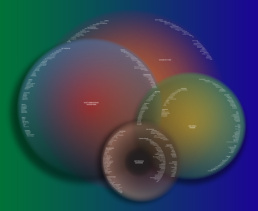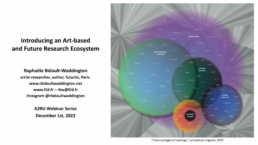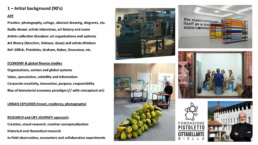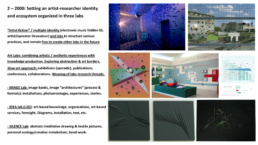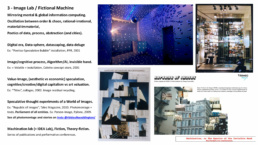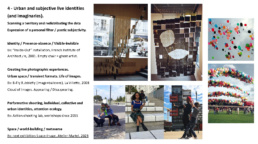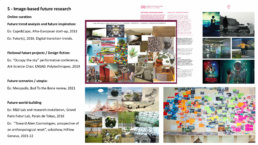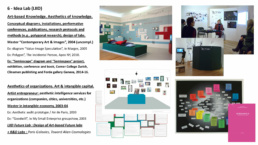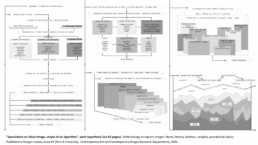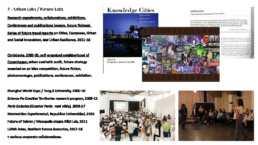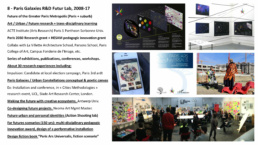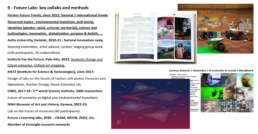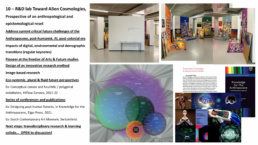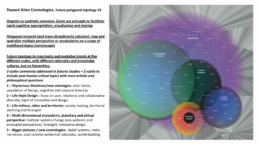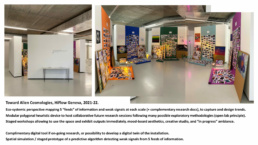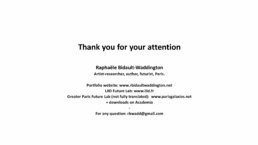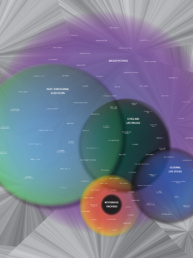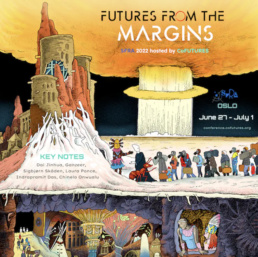Futurescape: Art x Future x Learning x IA, ISC Campus, Paris, 2023-24
Futurescape Lab
Art, Future and Pedagogical Innovation Experimentation
ISC Campus, Paris, 2023-2024.
This one year experimental program with ISC revolves around the exhibition of a new version of the TAC Future Canvas deployed here in the form of an interactive installation called Futurescape and exhibited in the school hall.-
The installation becomes a vehicle for a series of educational and prospective experiments carried out with students, professors, the school’s management team and its corporate and institutional partners - taking the form of masterclasses, workshops, publication, events and keynotes.
-
The Futurescape Lab workshop explored critical issues related to AI using the installation and working off images of the future generated by ChatGPT. A report of the experiment is published in the school's White Paper dedicated to AI and Learning.
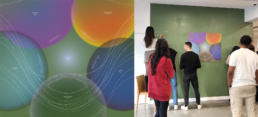
Présentation du projet
L’ISC est une école de commerce parisienne fortement positionnée et engagée sur la diversité et l’inclusion, ainsi que sur l’innovation pédagogique, notamment par son approche du Action Learning.
Conçu spécifiquement pour l’école qui souhaitait introduire une dimension artistique dans ses innovations, le projet Futurescape s’articulait autour d’une installation artistique et prospective exposée dans le hall de l’école et se déroulait en plusieurs séquences de fin 2023 à fin 2024.
L’installation comprend une nouvelle version du TAC Future Canvas avec toujours ses 5 sphères, accroché sur un grand mur peint en vert (couleur des tableaux d’école), sur lequel il est possible d’écrire au marqueur blanc.
En introduction du projet, le Masterclass « Art et Futurs Inclusifs », destiné aux étudiants du Master International (module pédagogique dirigé par Sabine Bacouel), permettait de montrer comment les expérimentations artistiques contribuent au futur et peuvent être des vecteurs d’innovation inclusive, notamment urbaine.
L’atelier Futurescape Lab (voir ci-dessous les détails), programmé pendant la Semaine de l’Apprendre de l’école, invitait les étudiants internationaux (niveau master), à explorer, en utilisant l’installation artistique, les enjeux de l’Intelligence Artificielle, grand thème de l’année de l’école.
Un long article paru dans le Livre Blanc de l’école a permis de mettre en lumière les bénéfices de l’expérimentation pédagogique, que ce soit : le principe de « futur lab » qui stimule l’engagement, l’imagination ou le désir de compréhension (donc de chercher de la connaissance et d’apprendre) ; la mise en scène et en espace de l’expérience qui permet d’avoir une bonne dynamique collective (action learning), de sortir du format du cours conventionnel, voire de transgresser le cadre de l’école (interdiction d’écrire sur les murs) ; le travail par l’image, le diagramme ou le grand format, qui permet de visualiser et de raisonner autrement ; la restitution publique des production à l’occasion d’un événement de l’école comme accélérateur de motivation pour faire un travail abouti ; etc.
Plusieurs événements à destination des entreprises partenaires de l’école rythmait l’année et ont permis de mettre en perspective et valoriser le projet parmi les innovations de l’école, tels que par exemple le partenariat stratégique avec le très prometteur Handilab, développé par la Fondation Fiminco à St Denis.
Atelier Futurescape Lab
L’atelier commençait par un temps de réflexion partagée sur l’ampleur des enjeux de l’IA grâce au diagramme qui permet d’appréhender l’ampleur des impacts et la bigger picture – et d’autant plus que ce diagramme est né d’une réflexion sur les enjeux prospectifs de l’IA, voir à ce sujet la genèse du TAC Future Lab.
Les étudiants étaient ensuite invités choisir des sous-thèmes, et à décrypter des images du futur de ces sous-thèmes produites par Chat GPT + Dall-e pour réfléchir à la vision du futur ‘imaginée’ par l’IA, affûter leur sens critique et gagner en discernement sur ses biais implicites.
Les trois sous-thèmes étaient : Future of Eating, Future of Work, et Future of Dating.
Venait ensuite un temps d’ouverture créative avec l’installation qui servait d’espace de brainstorming et de génération d’hypothèses prospectives sur le futur dans une vision élargie du monde, afin que les groupes croisent leurs étonnements, interrogations et idées. La possibilité de circuler dans l’espace, d’écrire sur le mur et d’échanger en toute liberté contribuait au décloisonnement de la réflexion.
Les groupes de travail avait ensuite pour tâche de construire une vision d’avenir de leur sous-thème sur de grandes planches visuelles, en se servant du TAC Future Canvas, d’images et d’informations recherchées en ligne.
Pour en savoir plus, télécharger l’article paru dans le Livre Blanc de l’école + qq images ci-dessous.
Research axes reminder
Axis 1: Transitions & Future Worlds
Axis 2: Foresight Methodology Innovation
Axis 3: Art & Future Research
Related articles
limit/no limit, Art & Design Research Conference, Paris, 2024
RBW zooms in on the TAC Future Lab work related to knowledge, whether it be the cognitive value of artistic formats,…
Designing Art-Based Future Labs, ZHdK, Zurich, 2023
RBW is invited to share the educational benefits of the experiments carried out in her various artistic, urban and…
Anticipated Worlds Festival, Cité of Sciences, Paris, 2022
The TAC Future Canvas here exhibited became a vast planisphere mapping the movements of the world toward alien…
Art & Future Labs as LX, Learning Planet Festival, 2022
RBW shared a wide range of artistic, urban and prospective research experiences (including TAC Future Lab), showing how…
Do They Dream of Electric Sheep?, Muzeum Susch, Switzerland, 2018
In this keynote, RBW shares her artistic and prospective reflections on the challenges raised by AI and the need to…
Future x IA x Speculative Design, Duperré Design School, Paris, 2018
In this workshop cycle on the future of/with AI, students discover the critical future challenges raised by AI, and…
Art, Innovation and Foresight Day, Louvre Lens Valley, 2024
Cultural Innovation and Foresight
in a world in transitions
“Art, Innovation and Foresight” Day, Louvre Lens Valley, Lens, 2024
Dedicated to the Louvre Lens innovation ecosystem and the members of the Louvre Lens Valley incubator’s acceleration program, this exploratory day included three masterclass sessions, followed by a workshop to analyze creative trends.-
The first allowed participants to discover the diversity of future approaches, from foresight to art, including design, innovation and science fiction. In the second, Raphaële Bidault-Waddington presented her various artistic and prospective labs, and the development of TAC Future Lab and its research tools (used in the workshop).
-
Serving as an introduction to the workshop the third session gave a panorama of transitions currently shaking up the world and shaping the challenges of future worlds. Then the future trend analysis workshop was co-constructed with the participants to address their more specific future challenges.
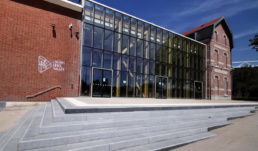
Présentation
Louvre Lens Valley, lieu hybride situé à proximité du musée du Louvre Lens, a été créé pour stimuler le développement de la région autour du musée. Il propose un programme d’accélération de projets dans le domaine des industries créatives et culturelles (ICC), et organise des événements tels que cette journée « Art, Innovation, Prospective » afin de fédérer, faire se rencontrer et fertiliser les écosystèmes d’innovation de la région.
Les participants de la journée sont issus des sphères aussi bien artistique et académique, qu’institutionnelle, entrepreneuriale ou associative.
Le premier masterclass donnait un aperçu de la diversité des approches du futur, que ce soit par l’innovation et le design, la prospective, l’aménagement territorial, la science-fiction, l’art, la modélisation des transitions ou l’analyse de tendance.
Dans le deuxième, RBW présentait son écosystème de recherche artistique et prospective remontrant de manière plus concrète comme l’art peut contribuer à l’innovation dans toutes ses dimensions – qu’elle soit technologique, durable, culturelle, sociale, territoriale, prospective, etc. -, puis le TAC Future Lab dont le diagramme méthodologique sera utilisé l’après-midi.
Le troisième masterclass (conférence iconique du TAC Future Lab, mais adaptée au public du Louvre Lens Valley), proposait une vision à 360° des grandes transitions environnementale, digitale et démographique qui font bouger le monde aujourd’hui, à approfondir en atelier…
Atelier
Afin d’optimiser la pertinence et l’utilité de l’atelier, les participants sont invités à choisir des thèmes prospectifs qui les concernent tout particulièrement et à se structurer en petit groupe de cinq personnes.
Après une présentation de la méthode et du TAC Future Canvas, chaque groupe mettait en marche une exploration des tendances comprenant : un temps de brainstorming, une recherche d’informations et d’images, un effort de reconceptualisation créative à l’aide du canevas et de planches de travail, ainsi que des temps de partages et de discussion avec les autres groupes.
Les groupes formés ont ensuite poursuivi ce travail d’amorce en toute autonomie pendant les semaines qui suivaient l’atelier, et en soutien du développement de leurs projets ou activités.
Research axes reminder
Axis 1: Transitions & Future Worlds
Axis 2: Foresight Methodology Innovation
Axis 3: Art & Future Research
Related articles
Researching the Future through Art, IFTF Foresight Talks, 2023
The prestigious Institute For The Future in Palo Alto invites RBW in this selective webinar series to present her…
SF and Innovation: Analysis of Ready Player One, Tech & Innovation Review, 2023
In this article, the TAC Future Canvas is used to audit the innovations and vision of the world expressed in the film…
Artistic Research For Future Challenges, A2RU x Learning Planet Festival, 2023
Panel with artistic research actors who explored the many levers of creativity, build bridges between artistic…
Future of Museums, Museum of Art and History, Geneva, 2022-23
This vast ‘future lab’ (10 months) on the future of museums has made it possible to sustainably instill prospective…
Futures Fields exhibition, HiFlow, Geneva, 2021-22
Designed as an algorithmic ‘open polygon’ and as a speculative design experiment, the exhibited installation allowed…
Our Knowledge Builds New Worlds, CNRS 80 yrs anniversary, Paris, 2018-19
This 'future lab' is created within the CNRS Communications Department to help its entire team (20 employees), to…
limit/no limit, Art & Design Research Conference, Paris, 2024
TAC Future Lab
opening new epistemological and pedagogical horizons
limit/no limit, AD REC (Art&Design), ENSCI, ENS Saclay and Paris Sorbonne 1 and 3 Universities, Paris, 2024
This presentation is an opportunity to zoom in on questions related to knowledge addressed at TAC Future Lab.If the experiments carried out make it possible to demonstrate the pedagogical and transdisciplinary virtues of the TAC Future Canvas, the presentation emphasizes the production of knowledge through art, whether (as in our case) through image-based research (moodboards), diagrams or the design of installations that are artistic, performative and heuristic.
-
On the other hand, the current transitions raise many challenges in terms of knowledge (post-truth, AI, learning and education for sustainability, post-colonial pluriversalism, etc.); the ongoing anthropological refoundation process is fully coupled with a epistemological refoundation to apprehend the world and think of its futures. The TAC Future Canvas is meant to open new perspectives on the diversity of epistemological frameworks.
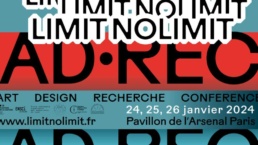
Abstract
Par son ampleur planétaire inédite, le contexte actuel de transitions multiples (monde VUCA, Deep Transition) est une invitation, si ce n’est une obligation, de repenser notre manière d’habiter la planète, de voir le monde et de nous projeter vers l’avenir. Comment refaire monde lorsque tous nos cadres anthropologiques et épistémologiques sont remis en question ?
A l’occasion de cette communication nous partagerons des éléments de recherche issus du TAC Future Lab (TAC pour Toward Alien Cosmologies – journal de recherche bientôt disponible sur tacfuturelab.org) menés depuis 2018. Son objectif est d’explorer comment concevoir de nouveaux mondes futurs dans une démarche d’innovation méthodologique transdisciplinaire mêlant prospective, art conceptuel, design, philosophie et pédagogie inclusive, parmi d’autres disciplines mobilisées dans les travaux du lab. Afin de s’émanciper des cadres épistémologiques conventionnels tout en respectant leur héritage et la possibilité de les relier, la création de nouveaux vocabulaires, architectures cognitives et ingénieries d’idées en est un point essentiel.
La démarche du lab inclue le design de diagrammes artistiques et méthodologiques, permettant d’ouvrir des espaces de recherche prospective radicalement transdisciplinaires et multidimensionnels (que nous appelons recherche polygonale), de croiser les savoirs et les points de vue, et d’explorer de nouvelles formes de monde. Ces dispositifs heuristiques, qui peuvent être spatialisés et mis en scène à l’occasion d’ateliers ou d’expositions, laisse leur place à l’imagination et à l’inconnu (ce que nous appelons le facteur alien), point sur lequel l’apport de l’art s’avère décisif et contribue à l’effort d’innovation pédagogique et d’empowerment du lab.
RBW
Intervention slides
A propos de limit/no limit, AD REC, Paris
La conférence limit/no limit, qui aura lieu du 24 au 26 janvier 2024 dans le cadre de Art Design Recherche Conference [AD•REC], invite les esprits créatifs, les chercheurs et les passionnés d’art et de design à se rassembler pour mener une réflexion sur la question de la limite dans le contexte de la recherche artistique et de la conception en France. Le comité scientifique a sélectionné 40 propositions sur plus de 150 qui reflètent une approche critique et réflexive, ainsi que des contributions qui présentent des exemples concrets de collaborations interdisciplinaires et résilientes.
Dans un monde façonné par la modernisation des sociétés et la diffusion rapide d’un modèle productiviste capitaliste mondialisé, cette conférence se veut une plateforme de réflexion critique et créative sur les défis sociétaux actuels. limit/no limit propose d’explorer différentes dimensions historiques et géographiques de la notion de limite, soulevant des questions cruciales.
Axes de recherche de la conférence :
1. RESSOURCES / La recherche en art et en design pour de nouvelles articulations entre communautés humaines et ressources naturelles.
2. SYSTÈMES / De quelle manière l’art et le design contribuent-ils à construire de nouveaux modèles de société ?
3. ÉPISTÉMOLOGIE / Comment l’art et le design contribuent-ils à la fabrication de nouveaux modes de savoirs ?
Site et programme de la conférence : limitnolimit.fr
Compte-rendu de toutes les inteventions sur le padlet de la conférence.
Research axes reminder
Axis 1: Transitions & Future Worlds
Axis 2: Foresight Methodology Innovation
Axis 3: Art & Future Research
Related articles
TAC World-building, 25th World Future Studies Federation Conference, Paris, 2023
This conference shows how the TAC Future Canvas was designed, how it rearticulates other tools and conceptual models…
Designing Art-Based Future Labs, ZHdK, Zurich, 2023
RBW is invited to share the educational benefits of the experiments carried out in her various artistic, urban and…
Artistic Research For Future Challenges, A2RU x Learning Planet Festival, 2023
Panel with artistic research actors who explored the many levers of creativity, build bridges between artistic…
Future visualization experiments, Exploring Next, Association of Professional Futurists, 2022
This intervention zoomed in on the artistic aspects of TAC Future Lab and presents in detail the TAC Future Canvas and…
Designing Post-Human Futures, Knowledge for the Anthropocene, 2021
This long essay lays the basis of TAC Future Lab methodological and transdisciplinary research, mixing learnings from…
‘Prototyping Futures’ Symposium, ‘Cybiosis’ Circle, NSU, Diffrakt, Berlin, 2020
This intervention was an opportunity to prefigure, share and discuss a first draft of the TAC Future Canvas, designed…
TAC World-building, 25th World Future Studies Federation Conference, Paris, 2023
Toward Alien Cosmologies (TAC)
a future world-building approach
“Exploring Liminalities”, 25th World Future Studies Federation Global Conference, Ecole des Ponts, Paris, 2023.
This intervention scheduled in the session 'Science-Fiction, Future Worlds & Cosmologies', is an opportunity to reposition the work of TAC Future Lab in the international future research agenda, and to clarify how the TAC Future Canvas contributes to the discipline’s response to the current paradigm shift - which futurists agree on.-
The diagram proposes a new critical "topology" of the future, structured in 5 spheres / 5 scales (onto, micro, meso, macro, cosmo) of transformation, used to map current trends and transitions, or to design future worlds.
–
While rearticulating other prospective tools, the canvas also allows to integrate or re-envision other approaches of the future and of world-building.
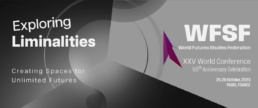
Abstract
In this presentation, we will clarify why the current paradigm shift and liminal stage call for the design of post-humanist future worlds, as open bigger pictures, in which future scenarios, trends, transitions, or strategies can unfold.
As we will show, the three large digital, environmental, and demographic transitions are in the process of disrupting western anthropological and epistemological foundations, and require new visions of the world and future cosmologies – the term is used here in its anthropological sense, i.e., as ways of ordering the world and giving meaning to existence.
The Anthropocene asks to reinvent the human condition on Earth, ranging from daily life-styles to our relation and thinking of nature, from urban ecosystems to the global economy, from legal frames to holistic global perspectives and including our relation to outer space, and the future horizon. Simultaneously, the digital transition is also impacting the entire society from most intimate aspect of life such as dating, to the geopolitical order, from work and business to education and health… The technological acceleration even generates new alien realities and ontologies such as AIs, xeno-bots, distributed autonomous organizations and metaverses becoming protagonists, stakeholders, and life-milieus to make a society and worlds with…
These extended transitional processes include revisiting all our rationalities, in search for new forms of post-colonial equities, imaginaries, and universalisms, while the global demography is also in deep transformation.
From that ecosystemic perspective, we will introduce a fluid and multiscalar matrix to design future worlds, resulting from an iterative methodological research process (initiated in 2017) and combining elements from foresight, futures design, world-building, Multi-Level Perspective, transition design and art.
RBW
Presentation slides
About "Exploring Liminalities", 25th WFSF Global Conference
Complex systems are predictable – until they are not! At a time of pan- and perma-crises… war-ridden continents, pandemic, climate change… that do not stand alone, but are intertwined and in complex relation with each other, feeding upon the disruption they engender individually and jointly, the fateful tipping point may indeed seem nigh. Whether the tipping point is before or behind us, we are certainly in a liminal state – a state of flux, in between worlds.
Liminality is a state of emergence and becoming. A state of possibilities and of transformations, as well as a state of radical uncertainty and not knowing. A state in which how we respond to the problem – as individuals, organisations, even society – may in fact be part of the problem! A state in which the tried and true may transform into the tired and treacherous. A state that requires new questions, new perspectives, new futures to explore.
The conference has two full days of presentations, networking and workshops at the École des Ponts Business School in Paris on the 25-27th October, and pre-conference side-events and activities on the 23-24th October. To celebrate the 50th Anniversary of the Federation, we are organising activities that reflect the past 50 years, and discuss the next 50 years.
We choose liminality as an organising concept for the conference to reflect on the liminalities we are experiencing today. As futurists, we are dealing with change, transformation and uncertainty, and as transitioning into new stages, we are often confronted with liminal spaces that exists between pasts and futures. We have a wide range of tools to explore future opportunities and prepare the present to transform into preferable futures. Our community of futurists is committed to practice futures studies and foresight in all areas of life, and always stay inclusive and open to all members of society. Our members are practicing futures studies and foresight in all levels of industry, government, NGOs, and also, make sure that education of all levels is also includes futures and futures thinking.
The aim of this conference is to bring together scholars, researchers, and practitioners from a wide range of disciplines to explore the concept of liminality and its implications for our understanding of human experience, identity, and culture. Through a series of presentations, workshops, and discussions, we hope to generate new insights, spark innovative ideas, and build a community of scholars and practitioners who are committed to exploring and practicing futures.
Conference program: wfsf2023paris.org
Session ‘Science-Fiction, Future Worlds and Future Cosmologies’ moderated by Thomas Lombardo, director of the Center for Future Consciousness
Research axes reminder
Axis 1: Transitions & Future Worlds
Axis 2: Foresight Methodology Innovation
Axis 3: Art & Future Research
Related articles
limit/no limit, Art & Design Research Conference, Paris, 2024
RBW zooms in on the TAC Future Lab work related to knowledge, whether it be the cognitive value of artistic formats,…
Artistic & Polygonal Research on Time multidimensionality, PRIMER, 2022
Exploring the future also means questioning the temporal architectures and frameworks on which human life is…
Future visualization experiments, Exploring Next, Association of Professional Futurists, 2022
This intervention zoomed in on the artistic aspects of TAC Future Lab and presents in detail the TAC Future Canvas and…
Ethics & Philosophy of Futures, Association of Professional Futurists, 2022
RBW introduced here the different philosophical references that irrigate the work of TAC Future Lab, whether in its…
Designing Post-Human Futures, Knowledge for the Anthropocene, 2021
This long essay lays the basis of TAC Future Lab methodological and transdisciplinary research, mixing learnings from…
‘Prototyping Futures’ Symposium, ‘Cybiosis’ Circle, NSU, Diffrakt, Berlin, 2020
This intervention was an opportunity to prefigure, share and discuss a first draft of the TAC Future Canvas, designed…
Researching the Future through Art, IFTF Foresight Talks, 2023
Researching the Future through Art
Foresight Talks webinar series
Institute For The Future (IFTF), Palo Alto, USA, 2023.
This webinar, organized by the prestigious Institute For The Future in Palo Alto, with which she had already worked in 2012, was an opportunity for RBW to present her entire ecosystem of artistic and prospective research, organized into different laboratories.-
Her artistic practices, whether those of her Image Lab, or the creation of artistic diagrams, allow her to introduce artistic materials and formats into prospective research experiments, especially in her R&D labs such as Paris Galaxies (2008-17), and TAC Future Lab.
-
The future insights she produces also emphasize the contribution of the cultural sphere to the making of the future, and all the more for the future of resilient cities.
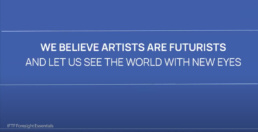
Webinar presentation
“When logic only gets us so far, art provides a creative free zone to explore and begin a mindset transition to future solutions”.
In this new episod of the Foresight Talks, IFTF invites Raphaële Bidault-Waddington, artist and futurist, founder of LIID Future Lab in Paris, in a conversation with Rachel Hatch, IFTF Chief Operating Officer.
During the session, RBW will come back on her hybrid background and artistic research journey, which lead her to become a futurist, and share some concrete projects – including with IFTF and Aalto University in 2012 -, showing how she designs transdisciplinary laboratories and methodologies.
As part of LIID Future Lab’s R&D, she carried from 2008 to 2017 a multi-awarded project on the future Greater Paris Metropolis at Paris 1 Pantheon Sorbonne University with an ecosystem of partnering schools, which allowed to experiment truly out of the box future research experiences on near and far futures (150 yrs ahead).
Since 2017, LIID’s latest R&D TAC Future Lab addresses the current Anthropocene, AI and post-humanist paradigm shift, which deeply shakes western anthropological and epistemological foundations, and explores new research strategies to co-create meaningful futures.
Recording of the webinar available on Youtube
Intervention slides
Research axes reminder
Axis 1: Transitions & Future Worlds
Axis 2: Foresight Methodology Innovation
Axis 3: Art & Future Research
Related articles
TAC World-building, 25th World Future Studies Federation Conference, Paris, 2023
This conference shows how the TAC Future Canvas was designed, how it rearticulates other tools and conceptual models…
Artistic Research For Future Challenges, A2RU x Learning Planet Festival, 2023
Panel with artistic research actors who explored the many levers of creativity, build bridges between artistic…
Art & Future Research, Alliance for Artistic Research in Universities, USA, 2022
RBW retraces the development of her laboratories, starting from their roots in the legacy of conceptual and…
Art & Foresight, 24th World Future Studies Federation Conference, Berlin, 2021
If Art and Time have a long joint history, it was shown here how artistic ecosystems can be envisioned as ‘signals of…
Art x Futures, ‘Blended Futures’ Foresight Journal panel, UNESCO FL Summit, 2020
Drawing on a large scope of international examples, the presentation builds on how artistic productions have been…
Do They Dream of Electric Sheep?, Muzeum Susch, Switzerland, 2018
In this keynote, RBW shares her artistic and prospective reflections on the challenges raised by AI and the need to…
Designing Art-Based Future Labs, ZHdK, Zurich, 2023
Designing Art-Based Future Labs
closing keynote
Labor Digital International Conference, ZHdK (Arts Academy), Zurich, 2023
In this conference at the Art academy of Zurich, Raphaële Bidault-Waddington is invited to present her various artistic and future research laboratories and to show how they foster transdisciplinary knowledge production and sharing, facilitating learning through investigation and collaborative experimentation.-
Her R&D lab Paris Galaxies on the Future of Greater Paris has made it possible to prototype numerous methodologies from 2012 to 2017, whether through images, stories, projects or workspaces - including in the urban space which becomes a playground and learning terrain. Following this lab, TAC Future Lab has been experimenting with other exploratory modalities since 2017.
–
In the introduction, she reformulates a definition of the laboratory as a conceptual and fluid framework to structure and carry a research process around critical issues, using a diversity of methodologies and formats, that can be artistic, academic, prospective, innovative, or hybrid.
Presentation
Raphaele Bidault-Waddington, is the founder of LIID Future Lab, a foresight research platform designing future labs in artistic, academic, urban and corporate contexts.
From 2012 to 2017, its multi-awarded lab on the future Greater Paris metropolis (with Paris 1 Pantheon Sorbonne University) prototyped a series of mixed future research and transdisciplinary pedagogic innovations. Its latest R&D lab “Toward Alien Cosmologies” addresses post-human futures and continues innovating at the frontier of future research, art and co-learning.
Interview following the conference
What does the format of the lab/laboratory mean to you?
Historically laboratories were specific spaces where to access certain tools, make experiences or design and test experimental protocols in order to extract learnings, to innovate or to produce (scientific and non-scientific) knowledge. The concept of laboratory is in fact rather fluid. In a more recent time, other types of laboratories without specific tools and places, such as learning lab, urban labs, living lab, future lab, art lab, and so on, have emerged. Philosopher Bruno Latour has even introduced the idea that the real world should be the laboratory to learn directly from.
As an alternative definition, in the last twenty years, I have been using the notion of laboratory as a conceptual frame to design, organize and unfold a research process, geared toward a certain critical challenge or topic, and combining experiences or experiments, and learnings (knowledge production and sharing). These learnings can be considered scientific if the lab respect academic rules and protocols, and positions them in relation to a discipline’s state of the art. But they can also be hybrid, peri-scientific or non-scientific when other methods, experiments and knowledge formats are used.
The labs I create as an artist-researcher and future lab designer, always have a speculative dimension, and mix artistic, future, urban and transdisciplinary academic research methods, experiences and formats. Then a laboratory can be very short or very long (from one day to several years), evolve through time (different than a project or a production with a clear expected output), more or less open and collaborative, and involve a small or large number of participants.
What’s your favorite project that explores the future with a lab perspective?
My most thrilling project at the moment is the future lab “Toward Alien Cosmologies” that I started in 2017 to explore Artificial Intelligence future implications, and then expanded to the Anthropocene and post-Truth paradigms, which raise similar holistic future challenges. This lab is my most advanced future research where I’m trying to design new ways of exploring possible future worlds (cosmologies) when everything and at all scales, is radically uncertain.
The Anthropocene requires that we reinvent the way we live on Earth; AI (and technologies) challenges human capacities, certitudes, and politics and raise deep ontological issues; and the post-Truth shakes our relation and trust in any form of truth, as if everything has become somehow alien. This paradigm calls for a profound anthropological and transdisciplinary epistemological reset, which cannot be address with conventional rationality and that’s why and where Art is important. This lab is certainly not reasonable, in all the senses that term can take.
It also echoes post-humanist questions and philosophies as I develop in my article “Designing post-human futures” in Knowledge For the Anthropocene (E. Elgar Press, 2021).
A dedicated website, recollecting all the lab’s research episodes (workshops, exhibitions conferences and publications in France, US, Norway, Germany, Switzerland, etc.) since 2017 is due later this year.
Suite de l’interview sur le site du E-Learning Lab de ZHdK
Intervention slides
About Labor Digital Conference
The conference will explore the questions of which scientific and historical foundations today’s labs are based on. Which exploratory learning and teaching forms, which interdisciplinary methods are lab-specific and what potential does the digital laboratory have for inspired, critical thinking?
Will the learning of the future take place in labs? Can experimental, explorative learning with experts and peers facilitate innovative forms of teaching and learning?
What role does digitality play, and what artistic and design-oriented approaches are we developing in labs? And how can we integrate these methods as small interventions in teaching practice or use them as an entire teaching unit? We will explore these questions analytically and playfully at the LaborDigital conference.
Programme de la conférence : https://paul.zhdk.ch/course/view.php?id=2312#section-2
Compte-rendu de la conférence : https://elearning.zhdk.ch/experience/labordigital-experimental-learnings-an-der-zhdk-1
Research axes reminder
Axis 1: Transitions & Future Worlds
Axis 2: Foresight Methodology Innovation
Axis 3: Art & Future Research
Related articles
Futurescape: Art x Future x Learning x IA, ISC Campus, Paris, 2023-24
Artistic and prospective exploration program over a year including an interactive installation, experiential workshops,…
limit/no limit, Art & Design Research Conference, Paris, 2024
RBW zooms in on the TAC Future Lab work related to knowledge, whether it be the cognitive value of artistic formats,…
Art & Future Research, Alliance for Artistic Research in Universities, USA, 2022
RBW retraces the development of her laboratories, starting from their roots in the legacy of conceptual and…
Art & Future Labs as LX, Learning Planet Festival, 2022
RBW shared a wide range of artistic, urban and prospective research experiences (including TAC Future Lab), showing how…
Art x Futures, ‘Blended Futures’ Foresight Journal panel, UNESCO FL Summit, 2020
Drawing on a large scope of international examples, the presentation builds on how artistic productions have been…
Future x IA x Speculative Design, Duperré Design School, Paris, 2018
In this workshop cycle on the future of/with AI, students discover the critical future challenges raised by AI, and…
Artistic Research For Future Challenges, A2RU x Learning Planet Festival, 2023
Artistic Research For Future Challenges
panel organized by A2RU (Alliance for Artistic Research in Universities)
Online program of the Learning Planet Festival, Learning Planet Institute (ex-CRI), Paris, 2023.
This highly open festival brings together each year a vast international academic and peri-academic community, engaged in the field of education, knowledge production for Sustainable Development, and inclusive pedagogical innovation.-
In this context, A2RU (federation of universities attached to the University of Michigan, USA) invited a selection of artistic research actors serving these goals, whether by deepening the levers of creativity, by creating bridges between artistic experimentation and innovation, by fostering trans-disciplinarity, and or by getting involved in foresight.
-
Raphaële Bidault-Waddington emphasizesd the specific vocabulary that she designs, such as the notions of idea engineering, aesthetic intelligence, polygonal research, and “art-based future research” to innovate on these different questions.
-
Dans ce cadre, A2RU (fédération d’universités rattachée à l’Université de Michigan, USA) invite des acteurs de la recherche artistique venant servir ces enjeux, que ce soit en approfondissant les leviers de la créativité, en créant des ponts entre expérimentation artistique et innovation, en favorisant la transdisciplinarité, et ou encore en allant vers la prospective.
-
Raphaële Bidault-Waddington met l’accent sur le vocabulaire spécifique qu’elle utilise, tel que les notions d’ingénierie d’idées, d’intelligence esthétique, de recherche polygonale, de « art-based future research » pour adresser ces différentes questions.
Panel presentation
In recent years, a growing number of researchers from the field of the Arts, are developing, in and beyond academia, innovative approaches to address the future and its critical challenges, such as the environment, post-coloniality or technologies, and have an increased impact on society.
The arts are a universal language. In our education systems and research methodologies, these essential tools and perspectives the arts offer have been underutilized. This group of creative futurists and arts-integrated researchers are working to re-integrate the arts to benefit learning and understanding of the earth and each other. Artists and creatives are known for methods that are speculative, non-reductive, and attend to both humanistic and natural concerns. This session will explore the promise and the power of the arts to address systemic problems.
For this exploratory round-table at the Learning Planet Festival, a2ru is pleased to invite four art-based researchers who are pursuing pioneering research practice, platforms and strategies to contribute to future research and positive change. Together, they will share their experience, and discuss how to better value and amplify that movement.
Participants in this roundtable are actively exploring and practicing creative integration in the public sector, higher education, and industry.
Speakers:
Aaron Knochel, Professor, Penn State University
R. Benjamin Knapp, Director, ICAT, Virginia Tech
Raphaële Bidault-Waddington, artist-researcher, futurist, LIID Future Lab
Theo Edmonds, Associate Dean/Co-Founder, University of Colorado Denver/Imaginator Academy
Moderator: Maryrose Flanigan, Executive Director, Alliance for the Arts in Research Universities (a2ru).
Recap : https://a2ru.org/recap-a2rus-artistic-research-for-future-challenges/
Research axes reminder
Axis 1: Transitions & Future Worlds
Axis 2: Foresight Methodology Innovation
Axis 3: Art & Future Research
Related articles
Do They Dream of Electric Sheep?, Muzeum Susch, Switzerland, 2018
In this keynote, RBW shares her artistic and prospective reflections on the challenges raised by AI and the need to…
Our Knowledge Builds New Worlds, CNRS 80 yrs anniversary, Paris, 2018-19
This 'future lab' is created within the CNRS Communications Department to help its entire team (20 employees), to…
Art & Future Labs as LX, Learning Planet Festival, 2022
RBW shared a wide range of artistic, urban and prospective research experiences (including TAC Future Lab), showing how…
Designing Art-Based Future Labs, ZHdK, Zurich, 2023
RBW is invited to share the educational benefits of the experiments carried out in her various artistic, urban and…
Researching the Future through Art, IFTF Foresight Talks, 2023
The prestigious Institute For The Future in Palo Alto invites RBW in this selective webinar series to present her…
Futurescape: Art x Future x Learning x IA, ISC Campus, Paris, 2023-24
Artistic and prospective exploration program over a year including an interactive installation, experiential workshops,…
Future of Museums, Museum of Art and History, Geneva, 2022-23
Future of Museums and Transitions
Incubation of an internal future lab for the museum teams
Museum of Art and History, City of Geneva, 2022-23
The project consisted of initiating a prospective exploration process (future lab) within the museum teams, in order to shift perspectives, look at the future, help employees to take ownership of their future, support the definition of a new museum concept, and accompany current and future transformations.-
The first step was 'Panorama of Transitions', a masterclass with almost all the staff (80 people), which enabled participants to take a step back and start to collectively address the profound changes in progress and the future challenges museums are facing.
-
These challenges were then deepened in a ten months program of workshops that irrigated the museum's various activities and ambitions. The teams were trained to continue the work in complete autonomy.
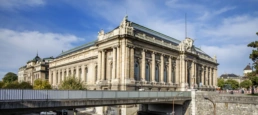
Présentation du projet
Situé au cœur de la ville, le Musée d’Art et d’Histoire de Genève est le 3e plus gros musée de Suisse, avec une collection de plus de 600 000 artefacts composés aussi bien d’œuvres d’art de différentes époques, que de pièces archéologiques, d’objets, d’armes, d’horlogerie, ou de numismatique. En choisissant un nouveau directeur issu de l’art contemporain, la Ville de Genève a souhaité donner un nouveau souffle à ce musée un peu vieillissant.
Le futur lab incubé a vocation à la fois à embarquer toutes les équipes du musée dans ce mouvement de réinvention audacieuse, et à nourrir la définition et le positionnement du nouveau concept muséal porté par la direction. L’objectif est de favoriser l’appropriation du futur par toutes les équipes en toute sérénité, et de soutenir la redéfinition du projet muséal et stratégique (en amont de toute communication), raison pour laquelle il s’est joué exclusivement en interne pour commencer.
Le masterclass introductif « panorama des transitions et enjeux prospectifs des musées » permettait à chacun de conscientiser le changement de paradigme actuel, et commencer à sentir et échanger sur comment les musées s’inscrivent dans ce monde en profonde transition. Le format masterclass (45mn de temps de parole, 45mn d’échanges à bâtons rompus avec le public) s’est avéré très efficace pour amorcer cette discussion collective (environ 80 participants).
Dans la foulée, les participants s’inscrivaient à un programme d’ateliers d’approfondissement prospectif dans les mois qui ont suivi, l’objectif étant qu’elles s’autoorganisent pour les poursuivre en toute autonomie. Par respect de nos engagements contractuels de confidentialité, nous ne divulguons pas les thèmes et contenus de ces ateliers prospectifs, dont certains sont très pragmatiques, appliqués ou stratégiques, d’autres plus spéculatifs, artistiques ou théoriques.
Le programme est accompagné de la mise en place d’outils de partage de connaissance et d’idées entre pairs, ainsi que d’un engagement et des modalités d’expérimentation régulière dans tous les départements du musées (conservation, programmation, services des publics, innovation, développement numérique, relations extérieures, gestion interne, etc.).
Des liens sont créés avec les autres programmes transverses ou extérieurs du musée (innovation, développement durable et urbain), ou encore avec le projet architectural associé au nouveau concept muséal en cours de définition.
Des points d’étapes réguliers permettent d’apporter des recommandations et d’affuter toutes ces modalités dans la plus grande fluidité.
Slides du masterclass introductif
Research axes reminder
Axis 1: Transitions & Future Worlds
Axis 2: Foresight Methodology Innovation
Axis 3: Art & Future Research
Related articles
Do They Dream of Electric Sheep?, Muzeum Susch, Switzerland, 2018
In this keynote, RBW shares her artistic and prospective reflections on the challenges raised by AI and the need to…
Towards Alien Cosmologies, prospective topology of a refoundation…, FHAP#4, 2020
This article offers a grand tour through the movements of the world and the critical future challenges they raise in…
Designing Post-Human Futures, Knowledge for the Anthropocene, 2021
This long essay lays the basis of TAC Future Lab methodological and transdisciplinary research, mixing learnings from…
Futures Fields exhibition, HiFlow, Geneva, 2021-22
Designed as an algorithmic ‘open polygon’ and as a speculative design experiment, the exhibited installation allowed…
Artistic & Polygonal Research on Time multidimensionality, PRIMER, 2022
Exploring the future also means questioning the temporal architectures and frameworks on which human life is…
Art, Innovation and Foresight Day, Louvre Lens Valley, 2024
Dedicated to the Louvre Lens innovation ecosystem, this ‘future lab’ day included three masterclasses on future and…
Art & Future Research, Alliance for Artistic Research in Universities, USA, 2022
Art & Foresight
Introducing an Art-based and Future Research Ecosystem
A2RU Webinar Series, University of Michigan, USA, 2022.
A2RU, a network attached to the University of Michigan and bringing together some forty American universities committed to artistic research, invited Raphaële Bidault-Waddington to present her artistic and prospective research ecosystem.-
During this webinar, she recalled its genealogy, starting with its anchoring in the legacy of experimental and conceptual art which, since the 70s, has valued art process, experience or ideas, and dialogues with theory as well as with society.
-
For more than twenty years, her laboratories have allowed her to address the frontiers of art with many fields (urbanism, knowledge, economy, etc.) and particularly future research. TAC Future Lab continues and remobilizes all of her experiences, creations and knowledge production
Intervention slides
Webinar presentation
A2RU welcomes French artist and futurist Raphaële Bidault-Waddington to present her expanded art and future research ecosystem. Building on the heritage of conceptual art, her initial statement in 2000 was to consider art as a vast laboratory to explore, question and open critical perspectives on the world, and as a way to produce knowledge, eventually disrupting conventions, borders or disciplines.
Exhibited and published, her image laboratory addresses topics ranging from aesthetic speculation and value(s) creation to cities, metaverses and future world-building, from the digital transition to the post-truth paradigm. Her idea laboratory (renamed LIID Future Lab in 2016), also occasionally published or exhibited, experiments collaborations with organizations at the frontier of art with knowledge, economy, critical design, urban design, innovation and future studies.
From 2008 to 2017, her R&D lab on the future Greater Paris metropolis, hosted at ACTE Institute (Arts Research), Paris 1 Pantheon Sorbonne University, was laureate of several selective academic research and pedagogic innovation programs. Her latest R&D future lab Toward Alien Cosmologies focuses on post-human and post-colonial futures, the Anthropocene and the related anthropological and epistemological reset.
Watch the Webinar: https://a2ru.org/event/introducing-an-art-based-and-future-research-ecosystem/
About the Speaker
Raphaële Bidault-Waddington is an artist-researcher, author and futurist based in Paris and working internationally. Since 2000 she has cultivated an art-based research ecosystem organized in “labs” exploring the borders of art, contemporary world transformations, and hypothetical futures.
Her work has been exhibited in galleries such as Apex Art, in New York, Over Gaden Art Center in Copenhagen, gallery Forde in Geneva, and Colette and La Villette in Paris, and published in art and theory reviews such as Marges (Paris St Denis University), Pylone in Brussels, Les Cahiers Européens de l’Imaginaires in Paris and Susch Muzeum Magazine in Switzerland. Via LIID Future Lab, she has experimented collaborations with universities (e.g., CNRS, Aalto University Helsinki, Parsons School, Science-Po Paris, Lausanne University, IHEST, etc.), urban projects (Copenhagen, Montevideo, Shanghai, Tehran, etc.), cultural places (e.g., Atelier LUMA Arles, Geneva Museum of Art and History) and companies (e.g., Peclers Paris, Bouygue Real Estate, Chanel).
She is a member of international research networks on knowledge economy and futures studies.
All her exhibitions, publications, conferences and collaborations can be viewed on www.rbidaultwaddington.net
Research axes reminder
Axis 1: Transitions & Future Worlds
Axis 2: Foresight Methodology Innovation
Axis 3: Art & Future Research
Related articles
Art x Futures, ‘Blended Futures’ Foresight Journal panel, UNESCO FL Summit, 2020
Drawing on a large scope of international examples, the presentation builds on how artistic productions have been…
Art & Foresight, 24th World Future Studies Federation Conference, Berlin, 2021
If Art and Time have a long joint history, it was shown here how artistic ecosystems can be envisioned as ‘signals of…
Art & Future Labs as LX, Learning Planet Festival, 2022
RBW shared a wide range of artistic, urban and prospective research experiences (including TAC Future Lab), showing how…
Designing Art-Based Future Labs, ZHdK, Zurich, 2023
RBW is invited to share the educational benefits of the experiments carried out in her various artistic, urban and…
Researching the Future through Art, IFTF Foresight Talks, 2023
The prestigious Institute For The Future in Palo Alto invites RBW in this selective webinar series to present her…
Art, Innovation and Foresight Day, Louvre Lens Valley, 2024
Dedicated to the Louvre Lens innovation ecosystem, this ‘future lab’ day included three masterclasses on future and…
Anticipated Worlds Festival, Cité of Sciences, Paris, 2022
Science Fiction and Metaverse
speculative conversation and exhibition
Festival des Mondes Anticipés, Cité des Sciences et de l’Industrie, Paris, 2022.
In this future-oriented festival, a new and large-scale version of the TAC Future Canvas was exhibited and became this time a rich panorama of creative concepts and future trends positioned on the five spheres, as inspirational signals of the future. In this context, the aim wass to invite the viewer to conduct their own imaginary investigation, in search of future worlds...-
In parallel to the exhibition, Raphaële Bidault-Waddington took part in a speculative discussion on metaverses following the projection of Ready Player One (Spielberg), a film that stages and shows the tensions between real, future, virtual and fictional worlds – a question she investigated in her article on this film published in the same period.
A propos du Festival
Pour sa première édition, le Festival des Mondes Anticipés explorera le thème « Il faut sauver le vaisseau Terre » grâce à diverses animations dont la projection de 4 films d’anticipation. Ceux-ci seront suivis d’échanges entre les spectateurs et des invités à partir de la question « Si le scénario du film advient, quelles en seraient les conséquences pour les individus et les organisations humaines ? ». Chaque projection sera précédée d’une conférence indépendante qui, elle aussi, explorera le thème de la saison.
Autour de la salle, les visiteurs pourront découvrir une exposition qui présentera les visions positives du thème de l’année proposées par des artistes (la dystopie est laissée au cinéma !). Ils découvriront également des œuvres (romans, BD, courts métrages, projets d’urbanisme/architecture).
En plus d’être accueillis par la Cité des sciences et de l’industrie, les Mondes Anticipés sont soutenus par le Ministère de l’enseignement supérieur, de la recherche et de l’innovation, par l’Institut des hautes études pour la science et la technologie, et Space’ibles, l’observatoire de prospective spatiale du CNES qui participe à la programmation du festival.
Cartel de l’œuvre
« Vers des Cosmologies Alien, prospective d’une refondation anthropologique », 250 x 280 cm.
de Raphaële Bidault-Waddington, artiste, auteure, prospectiviste, LIID Future Lab.
Vers des Cosmologies Alien est le laboratoire de R&D artistique et prospective développé par Raphaële Bidault-Waddington depuis 2017 afin d’adresser les grands défis planétaires qui secouent tous nos fondements anthropologiques.
L’ère de l’Anthropocène et la prise en compte de l’environnement montre combien les usages de société et les modes de vie hérités de l’ère industrielle, ne sont pas durables et doivent évoluer vers de nouveaux modèles d’habitabilité, sur Terre ou ailleurs, qu’il reste à inventer. De même l’avancée des technologies susceptibles d’augmenter l’humain comme de développer de nouvelles formes de vie, de corporéités, d’intelligence voire de conscience, obligent à reconsidérer ce que veut dire être humain, cet alien parmi les autres. Ceci convoque de nouvelles visions et ordonnancements conceptuels du monde, ce que les anthropologues appellent des cosmologies.
L’ampleur et la complexité des questions posées, requiert d’explorer de nouvelle manière de produire des connaissances qui transcendent les segmentations, logiques et disciplines, celles-ci étant souvent trop ancrées dans l’héritage rationaliste occidental. L’art est à ce titre une véritable ressource permettant à la fois d’ouvrir de nouvelles perspectives, intuitions ou raisonnements, comme de resynthétiser des vues d’ensemble.
Cette cartographie artistique, structurée en cinq sphères flottantes, entrelacées et non-hiérarchisées, est ainsi l’un des outils heuristiques du laboratoire, et permet de construire mentalement par l’imagination de possibles visions du monde et de l’avenir. Elle sert de canevas pour aussi bien cartographier des tendances ou scénarios prospectifs, que pour façonner ou analyser des univers futurs, qu’ils soient issus de la prospective ou de la science-fiction.
Discussion spéculative autour de Ready Player One (Spielberg, 2017)
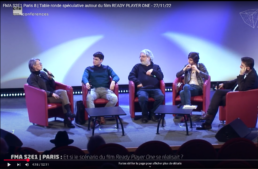
Modérateur : Thibault Renard, Cybercercle
Intervenants : Raphaële Bidault-Waddington, artiste et prospectiviste ; Camille Rouge, fonctionnaire ; Rémi Sussan, journaliste ; Sylvain Cavalier, youtubeur.
Voir la vidéo sur Youtube
Research axes reminder
Axis 1: Transitions & Future Worlds
Axis 2: Foresight Methodology Innovation
Axis 3: Art & Future Research
Related articles
Towards Alien Cosmologies, prospective topology of a refoundation…, FHAP#4, 2020
This article offers a grand tour through the movements of the world and the critical future challenges they raise in…
Futures Fields exhibition, HiFlow, Geneva, 2021-22
Designed as an algorithmic ‘open polygon’ and as a speculative design experiment, the exhibited installation allowed…
Future visualization experiments, Exploring Next, Association of Professional Futurists, 2022
This intervention zoomed in on the artistic aspects of TAC Future Lab and presents in detail the TAC Future Canvas and…
The Future as a moving panorama, Sci-Fi Research Association, University of Oslo, 2022
Science Fiction raises today strong interest for its ability to stage future worlds, whether utopian or dystopian. The…
SF and Innovation: Analysis of Ready Player One, Tech & Innovation Review, 2023
In this article, the TAC Future Canvas is used to audit the innovations and vision of the world expressed in the film…
TAC World-building, 25th World Future Studies Federation Conference, Paris, 2023
This conference shows how the TAC Future Canvas was designed, how it rearticulates other tools and conceptual models…
